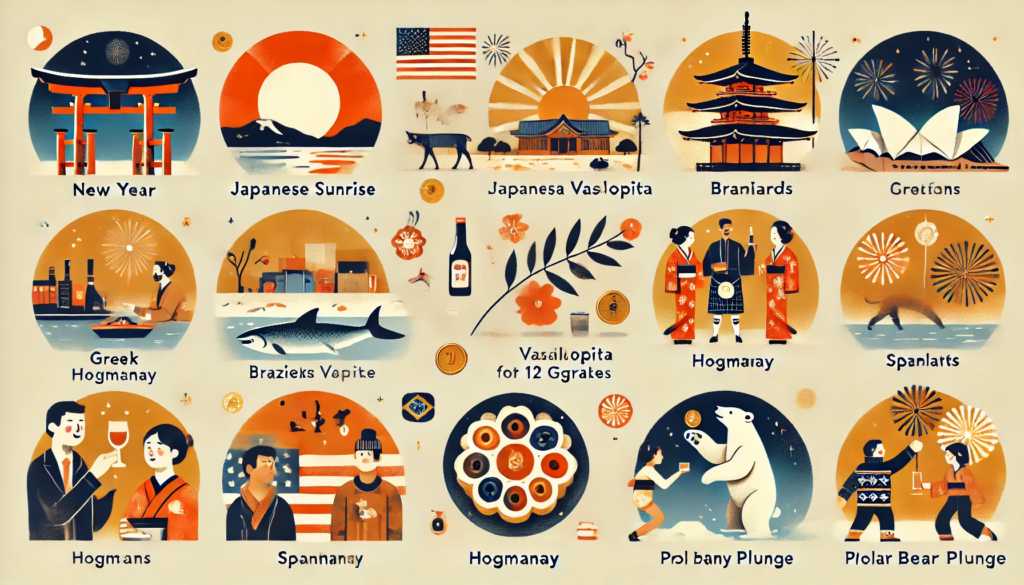
ChatGPT:
The History of New Year Celebrations Around the World reflects humanity’s fascination with time, renewal, and hope. Across cultures, New Year’s traditions often blend ancient rituals with modern practices, symbolizing letting go of the past and embracing new beginnings.
Ancient Beginnings
• Babylon (circa 2000 BCE): The earliest recorded New Year celebration dates back to ancient Mesopotamia. The Babylonians celebrated Akitu, a 12-day festival held in mid-March, marking the spring equinox and agricultural cycles. It involved rituals to reaffirm the king’s divine mandate.
• Egypt (circa 3000 BCE): The Egyptian New Year coincided with the annual flooding of the Nile, which symbolized fertility and rebirth.
• China (1046 BCE): The Lunar New Year, tied to the moon cycles, began during the Shang Dynasty. It honored ancestors and featured fireworks to ward off evil spirits.
Roman Influence
• Julius Caesar’s Calendar Reform (46 BCE): The Romans established January 1 as the start of the year, dedicating the day to Janus, the two-faced god of beginnings and endings. Romans exchanged gifts, made vows, and decorated their homes with laurel branches.
Medieval Europe
• In the Middle Ages, the Church shifted New Year’s celebrations to March 25 (Feast of Annunciation) to distance it from pagan roots. By the 16th century, Pope Gregory XIII’s Gregorian Calendar restored January 1 as New Year’s Day, a system we still use today.
Modern Traditions
New Year’s Day Traditions Around the World focus on renewal, good fortune, and starting the year with positivity. While New Year’s Eve often involves parties and countdowns, New Year’s Day is more about rituals, food, and customs to set the tone for the year ahead. Here are some unique traditions observed on January 1:
Europe
1. Austria – “Neujahrskonzert” (New Year’s Concert)
• The Vienna Philharmonic Orchestra performs its famous New Year’s Day concert, broadcast worldwide. It features waltzes and classical music to inspire joy and elegance.
2. Greece – Vasilopita (Saint Basil’s Cake)
• Greeks bake a cake with a hidden coin inside. Whoever finds the coin is believed to have good luck for the rest of the year.
3. Italy – Lucky Lentils
• Italians eat lentils (symbolizing coins) and cotechino sausage for prosperity and abundance.
4. Spain – Family Meals and Churros
• After the midnight grapes on New Year’s Eve, Spaniards often enjoy hot chocolate and churros on January 1 for a sweet start to the year.
Asia
5. Japan – Hatsuhinode (First Sunrise)
• Many Japanese people wake early to witness the first sunrise of the year, symbolizing hope and renewal. They may also visit shrines (hatsumode) to pray for blessings.
6. Korea – Seollal (Lunar New Year) (Note: Celebrated later, but significant)
• Koreans perform ancestral rituals and bow to elders, who give blessings and gifts of money. Special dishes like tteokguk (rice cake soup) are eaten to symbolize getting older and wiser.
7. India – Various Regional Celebrations
• Different regions celebrate New Year’s Day at various times based on lunar or solar calendars. However, January 1 is increasingly marked by temple visits, exchanging sweets, and lighting lamps for prosperity.
The Americas
8. Brazil – Beach Offerings
• Brazilians dress in white and visit beaches to offer flowers and candles to Yemanjá, the sea goddess, asking for protection and blessings.
9. United States – Polar Bear Plunge
• In coastal areas, people start the year with a daring swim in icy waters, symbolizing cleansing and renewal.
10. Mexico – Tamales and Wishes
• Families eat tamales and rosca de reyes (a ring-shaped sweet bread) while making wishes for the year ahead. Some also sweep their houses to clear out negative energy.
11. Colombia – Suitcase Ritual
• Colombians carry empty suitcases around the block to attract travel opportunities in the new year.
Africa
12. South Africa – Community Gatherings
• Many gather for prayers and church services to welcome the year with gratitude and blessings. In some areas, old furniture is tossed out to symbolize starting fresh.
13. Ethiopia – Enkutatash (Note: Celebrated in September)
• Though it follows its own calendar, Ethiopians celebrate the new year with flowers, feasts, and songs when it arrives.
Oceania
14. Australia – Beach Barbecues
• New Year’s Day is often spent outdoors with barbecues, picnics, and fireworks on the beach, reflecting the summer season.
15. New Zealand – Outdoor Adventures
• Many locals head to nature reserves for hiking or camping, emphasizing new beginnings with outdoor activities.
Shared Customs
While each culture is unique, some common themes emerge globally:
• Symbolic Foods: Eating lentils, pork, fish, or sweets for prosperity.
• Acts of Renewal: Cleaning homes, clearing debts, and starting new habits.
• Prayers and Blessings: Seeking spiritual guidance and good fortune.
These traditions highlight humanity’s universal hope for a fresh start filled with luck, health, and happiness.
